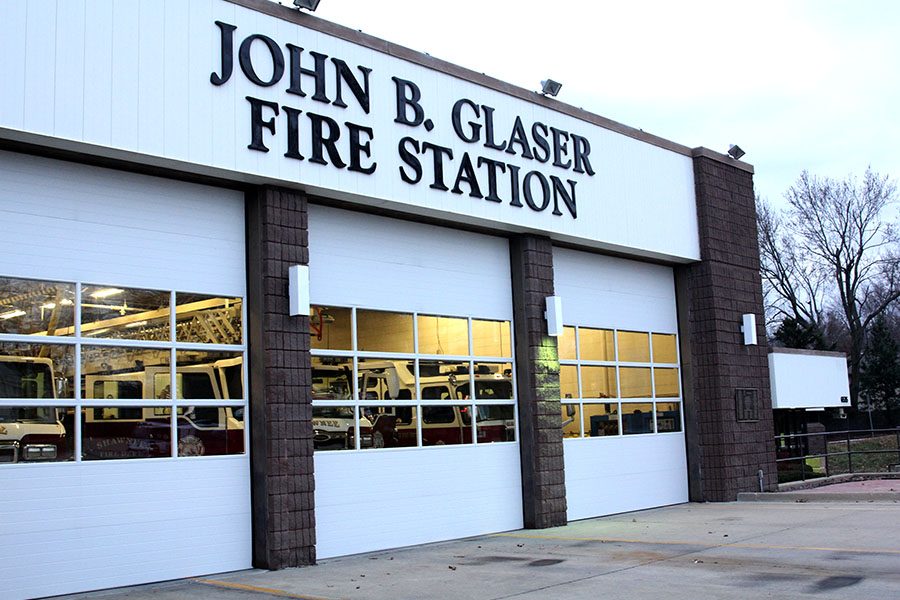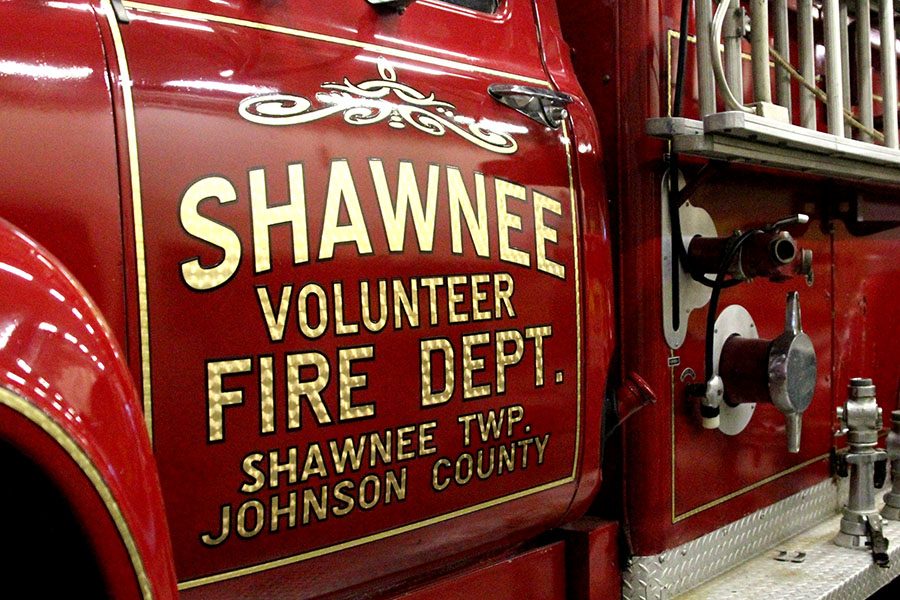The station was named after the fallen hero, John B. Glaser, who died while in the line of duty.
The John B. Glaser Fire Station comes together to protect the City of Shawnee
John B. Glaser Fire Station reveals behind the scenes of a firefighter's work life
The garage doors close and the smell of smoke lingers as sighs of relief after a long call are heard throughout the John B. Glaser Fire Station on Wednesday, Nov. 29.
In early 1924, the Shawnee Fire Department was organized when a group of citizens came together to collect enough money to buy a fire truck that would be staffed by volunteers. The group collected a little over $520 for a 1924 Ford Model-T that was delivered to Mayor Van Winkle and Chief Provost a few months before the council passed the first order regarding fire regulations. Firehouse 71 got its name “John B. Glaser” in 2010 when one of their firefighters died in the line of duty. Located at 6501 Quivira Rd., it is now the second-busiest firehouse in Kansas City.
The SFD is equipped to respond to fires, automobile accidents and medical emergencies. They have an aggressive training program consisting of 200-pound dummies, scenario practice, medical tests and equipment testing.
Firefighter Luke English has been working at Firehouse 71 for almost a year. Even when they’re not on call they still have work to do before the end of their shift.
“Unlike most people think, we don’t really sit around all day. We are usually training or working,” English said.
Their shifts start at 7 a.m. and last until 7 a.m. the following morning. An average day at the firehouse consists of recapping with the last shift to go over any difficulties, so they are fully prepared for the day. They check all of the equipment, have a quick breakfast, and then go to morning training. Later on, they work out before everyone helps make dinner around 4 p.m.. After dinner, everyone works on any school work, special projects or paperwork they have.
According to English, most firefighters in House 71 love helping each other out and being there for each other.
“[We have a] family atmosphere that a lot of people love about their job,” English said. “We make sure to sit and eat all together as if we’re a family.”
Going on different calls, the SFD works with the Shawnee Police Department on many of the same calls.
“We’re kind of teammates,” English said. “We always make sure to have each other’s back and help out whenever we can.”
According to English, the fire department is always facing new and different challenges, which means they have to work fast and know how to strategize.
“We are constantly training in different scenarios to be prepared in those situations,” English said. “[The] ways we do things are constantly changing.”
Because firefighting is a “risky career,” according to English, it takes a lot of training, skill and good emotional health. This proved to be true when an under-construction apartment building caught fire, burned to the ground, and spread fire to nearby homes in Overland Park on Friday, March 24. Fire departments from all across Kansas City metro area helped to stop the fire before it injured nearby families.
“That [was] one of those fires you will [only] see once in your lifetime,” English said. “That’s something that doesn’t happen very often.”
Every firefighter has their story and a different reason for joining the fire department. For English, he felt as if he “had everything” but wasn’t doing anything for others.
“I didn’t feeling like I was satisfied. I felt like I should always do more in the community and took a leap of faith. It’s the best job in the world,” English said. “There is always something new and it’s exciting.”
Being a firefighter pushes emotional boundaries and sometimes forces them to make tough decisions.
“I think the tough part with us [firefighters] is that when we go on a call, we just do what we are trained to do,” English said. “It becomes ‘we are just doing our job’ [and when] you go through it so much, you get a little desensitized to it. [But dealing with kids is] a lot harder than adults because a lot of people here have kids or younger siblings, so when we think about our children or siblings in those situations, it a lot harder to deal with.”
When on call, mindset is one of the most important assets to a firefighter, according to English. Being a firefighter goes beyond just knowing how to deal with fires and everything they train for or what they have to expect in order to get the job done.
“We have to think of all the possibilities and problems that may occur on call,” English said . “Not many people realize we don’t just train on fires and rescues; we train on medical, chemical spills and water assistance.”
When the bell goes off calling for truck 71, his team must act fast to put on their gear and make it to the called site. Easy access to gear and quick response is something the firefighters train for everyday.
“I’m always trying to stay one step ahead,” English said. “[We] have to be out the door in two minutes no matter if we’re sleeping, eating, or anything.”
Depending on the role of each firefighter, they may be the first to the fire or the last. English’s role is called the “nozzler” or the nozzle guy. He’s usually the first one in the burning building and carries the hose inside the house to slow down the fire’s spreading.
“You have to understand how to attack the fire depending on what building you’re in,” English said. “It’s not as simple as going through the door and spraying water on it. We do something called a 360 size up, meaning we think [about] how to get into the building without exposing the fire to more oxygen, when to spray down the fire and what to do if you get stuck in the fire.”
“However, fighting fires isn’t the only part of the job. Sometimes firefighters will go to the elementary schools in the shawnee area to speak about their career, causing kids to have great admiration towards the profession.
“Since I was young I always looked up to them. Like every little boy, I wanted to be a fireman,” sophomore Harrison Canning said. “Every time I would have a reward from my mom, she would ask me where I want to go, and I would say the Fire department.”
When a person needs help, they depend on those who trained and qualified to rescue them. Canning believes the SFD is essential to the safety of Shawnee.
“[To] me, firefighters play a vital role in emergency departments,” Canning said. “They are the one’s who constantly risk their lives rescuing people they may not even know, [but] they do it anyway.”
“Prepare, Prevent, Protect” is the motto that all Shawnee safety departments live by.
“Our job is to protect and rescue those in danger,” English said. “Getting the people out of the fire and making sure the crew is safe is our number one priority.”

